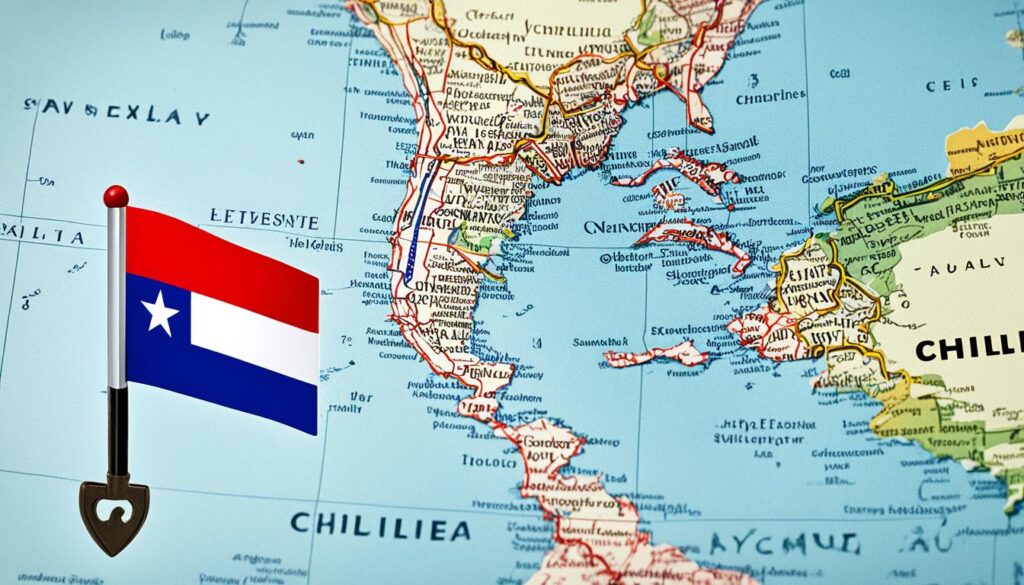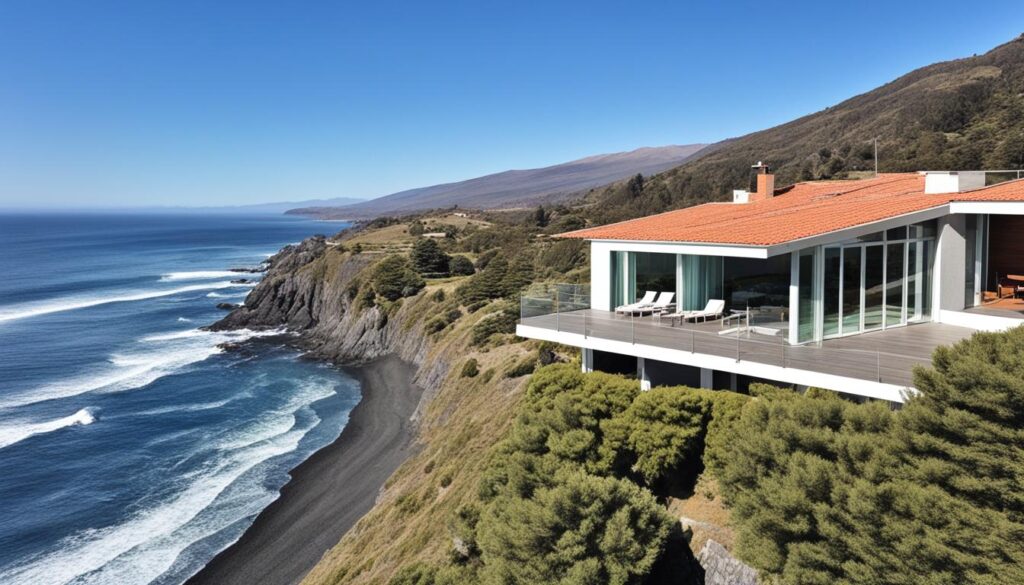Chile is quickly becoming a hotspot for overseas investors looking to capitalize on its vibrant real estate market. Can foreigners buy property in Chile? The answer is a resounding yes! Foreigners enjoy the same legal rights as Chilean citizens, allowing for a seamless process devoid of nationality discrimination. This accessibility, paired with the country’s breathtaking landscapes and robust economy, makes investing in real estate in Chile an attractive prospect.
However, potential buyers should familiarize themselves with the local laws governing property ownership and navigate the purchasing process appropriately. Chilean real estate offers various options—from bustling Santiago to picturesque Puerto Varas, where as much as 30% of the population consists of foreigners, primarily from Germany and the U.S1. Engaging in this market requires understanding essential factors such as residency requirements, taxation, and the kind of documentation needed for a successful transaction.
This guide will delve into the nuances of buying property in Chile, highlighting the pathways to ownership while ensuring that you are well-informed of the Chile real estate investment opportunities ready for exploration.
Key Takeaways
-
- Foreigners can buy property in Chile under the same rights as local citizens.
- Popular locations for property investment include Santiago, Vina del Mar, and Valparaiso.
- Understanding local laws and regulations is crucial for a successful purchase.
- The average property tax rate in Chile is about 0.5% of the property’s market value2.
- Engaging a local lawyer can help navigate the complexities of property transactions.
- Foreign buyers are subject to the same taxes and regulations as Chilean citizens.
- Real estate commissions range from 1.5% to 3% and are negotiable.
Contact us if you are Interested in Buying Property Abroad!
Introduction to Real Estate in Chile
The Chilean real estate market has emerged as an attractive destination for international investors due to its favorable conditions and vibrant economy. With 95% of real estate ownership open to foreign investors without restrictions, individuals from abroad find ample property investment opportunities in diverse locations ranging from bustling Santiago to the pristine landscapes of Patagonia3. While exceptions exist for properties near national borders or coastlines, the majority can be purchased freely by foreigners3.
Chile’s steady economic growth and rising property values enhance its appeal for foreign investment in Chile. Notably, property measurements differ significantly; smaller properties are listed in square meters, while larger ones are measured in hectares, providing clarity to potential buyers4. Tax implications also play a crucial role in decision-making. Owners must pay a Territorial Tax annually, which may be passed on to tenants, making it essential for investors to factor these costs into their budgets3.
Furthermore, the transparent nature of property ownership in Chile allows for the identity of owners to be accessible through public registries3. With various financing options and property types available, now is the perfect time to explore the Chilean real estate market. Interested buyers can find further details on the necessary steps and processes to navigate, right from obtaining a RUT number to securing their desired properties here.
Can Foreigners Buy Property In Chile

Yes, foreigners buying property in Chile is a straightforward process, as the country’s property ownership laws in Chile do not impose restrictions based on nationality. Foreign nationals enjoy equal rights as Chilean citizens when it comes to purchasing real estate as a foreigner. In fact, the laws allow investment without many hurdles, creating numerous opportunities for those seeking to invest in the real estate market.
Chile’s economic landscape is thriving, boasting a gross domestic product (GDP) of USD$335 billion in 2023, making it the fourth-largest economy in Latin America5. The country has also attracted USD$21.7 billion in foreign direct investment in the same year, underscoring its appeal to international investors5. Cities like Santiago and Valparaiso are particularly appealing, with about 90% of Chile’s population residing in urban areas, making them prime locations for property purchases6.
Real estate prices can vary significantly depending on the region. In Santiago, property prices range from around $255,000 for larger homes to approximately $3,000 per square meter for apartments in the highly sought-after city center6. Valparaiso offers slightly more affordable options, with large homes costing around $200,0006. While buying property near the borders requires special permission, most areas remain open for acquisition without residency requirements.
The process of buying property in Chile typically takes between 20 to 40 days and entails various fees, which can amount to about 5% of the purchase price. This includes real estate agency fees, notary charges, and a stamp duty along with the Value Added Tax (VAT) at 19%6. With Chile’s position as a leader in Latin America’s Human Development Index (HDI), it appeals to foreigners considering investment opportunities5.
Understanding Property Ownership Laws in Chile

Property laws in Chile are designed to protect the rights of all property owners, including foreigners. The Chilean Civil Code is the foundation of these laws, ensuring equitable treatment for everyone regardless of nationality. Under the Constitution, property rights are guaranteed, which provides a secure framework for both Chilean property ownership and foreign investment.
In terms of real estate legislation in Chile, there are no restrictions on the types of properties that foreigners can own. This opens up a wide range of investment opportunities. However, prospective buyers should be aware of local ordinances and zoning regulations, especially for commercial properties, which can significantly affect what the property can be used for.
There is a single land registry known as the Conservador de Bienes Raíces, although requirements may differ based on the property’s location7. Not all land rights require registration; for example, certain easements or lease contracts do not7. When considering engagement with real estate brokers, note that fees usually range from 2% to 5% of the sale price, with a common rate of 2% for sales transactions7.
Financing for property purchases typically comes from banks, insurance companies, and investment funds, with no major alterations in funding availability noted recently7. American citizens may purchase property in Chile without needing citizenship or special visas8. While obtaining a tax ID (RUT) is mandatory for property transactions, having a local bank account is not required but may simplify the process8.
It is crucial to highlight that there are no limits to the number of properties a foreigner can own in Chile8, although restrictions apply to areas near international borders. Coastal properties present a unique case, as the coast and beaches are considered public property8. Furthermore, foreigners enjoy the same rights as local citizens concerning their property ownership8.
Legal Requirements for Foreigners Buying Property in Chile

To engage in property transactions in Chile, foreigners must familiarize themselves with the legal requirements for foreigners. A key step in this process is obtaining a RUT number in Chile, which serves as the essential tax identification number. Foreign individuals and corporations face no restrictions on purchasing property, but the acquisition of a RUT is crucial for any real estate deal9.
Obtaining a RUT Number
Obtaining a RUT number is typically straightforward. Foreign buyers can apply at a local tax office by presenting valid identification and proof of a local address. It is worth noting that foreigners do not need to reside in Chile to secure this number, simplifying the buying process considerably2.
Documentation Needed for Purchase
The documentation for buying property in Chile includes several critical elements. Essential documents encompass:
- Proof of identity
- Title deeds to the property
- A title report confirming the legal standing of the property
- A legally binding purchase agreement
- Tax compliance certificates
It’s important that these documents are secured to navigate the purchase smoothly. The property buying process entails three major phases: negotiation and title search, contract signing, and title registration10. Notaries are the only qualified entities to conduct title searches, making their involvement vital for ensuring that full legal rights are granted upon purchase10. Each of these steps plays a significant role in confirming ownership and complying with Chilean real estate laws.
Types of Properties Foreigners Can Purchase

Foreigners looking to invest in Chilean real estate have access to various property types catering to different needs. Understanding the available types of properties in Chile can help potential buyers make informed decisions. Whether considering residential investment options or venturing into purchasing commercial real estate in Chile, foreign investors will find the market quite adaptable.
Residential Properties
Chile offers a wide range of residential properties from urban apartments in vibrant cities to serene beach homes along the coast. For instance, in Santiago, a 377-square-foot apartment located in the city center can be bought for approximately $52,0001. Additionally, areas like the Lake District in Puerto Varas are particularly attractive to expatriates, hosting around 30% of foreign individuals, predominantly from Germany and the U.S. A 1,722 square-foot house in this area, situated on a 50,000 square-foot land, is available for $239,6831.
Commercial Properties
Foreigners are not limited to residential spaces; purchasing commercial real estate in Chile opens pathways to lucrative investments. The flexibility in property types caters to tourism-related ventures and business operations. Investors must navigate local zoning laws and secure necessary permits for commercial transactions to ensure compliance. Chile’s favorable business climate, evidenced by its status as one of the top 20 largest recipients of direct foreign investments globally, makes it a promising location for commercial prospects9.
In addition, buyers should be aware that rural properties face an annual real property tax rate of 1%, while non-rural residential properties are taxed at 0.98% for values up to approximately $120,0004. The attractive investment environment in Chile is further enhanced by opportunities for various legal structures available to foreigners wishing to purchase properties9.
Steps to Purchasing Real Estate as a Foreigner
When considering the journey of owning property in Chile, understanding the steps involved is essential. The process entails crucial actions that pave the way for a successful investment.
Finding a Property
The initial phase revolves around conducting a comprehensive property search in Chile. Prospective buyers should utilize various resources, such as online platforms, local advertisements, and insights from local real estate agents. Engaging with agents familiar with the market can provide valuable insights into pricing trends and neighborhood characteristics.
Engaging with Local Real Estate Agents
Working with qualified local real estate agents is pivotal for navigating the complexities of the Chilean property market. An agent not only facilitates communication with sellers but also assists in understanding local laws and regulations. They offer assistance in negotiating terms, thereby streamlining the entire process. It’s advisable to inquire about the agent’s experience and the commission structures, which generally range from 2% to 3% of the property’s value11. By seeking a knowledgeable partner, buyers can enhance their buying experience and ensure compliance with all necessary legal requirements.
| Step | Details |
|---|---|
| 1 | Conduct a property search in Chile using various platforms and resources. |
| 2 | Engage local real estate agents for assistance in navigating the market. |
| 3 | Negotiate terms with sellers and ensure legal compliance. |
| 4 | Finalize your purchase by handling any necessary registration and fees. |
These steps to buy property in Chile not only simplify the process but also ensure a clear path toward ownership. It is vital to remember that potential buyers should be aware of the required documentation, including a tax ID known as RUT for property transactions8. Ultimately, having informed and experienced guidance will lead to a smoother transaction.
Contact us if you are Interested in Buying Property Abroad!
Chile Real Estate Investment Opportunities

Investing in Chile offers a promising landscape for real estate ventures. The country boasts a stable economy, ranking Santiago as the 53rd highest-income city globally, with an estimated production of USD 160 billion by 202012. Despite recent challenges, such as a decrease in home sales attributed to a 19% VAT on property sales, the Chile property market trends indicate potential for future growth12. For investors looking into rental properties, residential investments yield about 4 to 5%, while commercial properties can generate returns between 10 to 12%13.
The real estate growth potential in Chile is further evidenced by significant regional developments. Southern and Northwestern Santiago have notably driven apartment market prices since 2014, with a 12.7% increase in the first quarter of the year12. Additionally, investors can achieve impressive profits from short-term rentals, yielding up to 20% in central areas13.
With strong respect for property rights and minimal corruption, Chile is a favorable environment for global investors. The most desirable neighborhoods in Santiago, such as Providencia and Las Condes, cater to varying demographics, offering vast investment opportunities in Chile12. It is advisable for foreign investors to consider obtaining a RUT number to streamline tax compliance and optimize their financial strategies, integrating local regulations effectively13.
| Investment Type | Expected Profitability |
|---|---|
| Residential Properties | 4% – 5% |
| Office Spaces | 6% – 8% |
| Commercial Properties | 10% – 12% |
| Short-term Rentals | 15% – 20% |
Buying Land in Chile as an Expat

Expats interested in buying land in Chile will find a landscape ripe with opportunities. Foreign ownership of land is straightforward, with minimal restrictions, making it an attractive option for expat investments in land. The country offers various types of land, including agricultural plots and sites for residential development. It is essential to note that purchasing land near national borders may require special permission to comply with land ownership laws in Chile.
Engaging in a thorough due diligence process is vital. Prospective buyers should seek legal counsel to navigate the local regulations effectively. Understanding the market dynamics, including average land prices in sought-after regions, aids in making informed decisions. For instance, real estate prices are usually listed in Unidad de Fomento (UF), ensuring values are adjusted for inflation. This practice creates consistency in pricing, a significant consideration for anyone looking to invest in real estate in Chile14.
Additionally, working with real estate agents can enhance the buying experience. Their commissions typically range from 1.5% to 3% of the property price and are negotiable2. Given the unregulated nature of this profession in Chile, it is wise to verify the credentials of any real estate agent you work with to ensure a smooth transaction.
| City | Average Price per sqm (CLP) |
|---|---|
| Santiago | CLP 1,500,000 – CLP 4,500,000 |
| Valparaíso | CLP 1,200,000 – CLP 3,500,000 |
| Viña del Mar | CLP 1,800,000 – CLP 4,000,000 |
| Concepción | CLP 1,200,000 – CLP 3,000,000 |
| Puerto Varas | CLP 1,800,000 – CLP 4,000,000 |
| La Serena | CLP 1,200,000 – CLP 3,500,000 |
| Pucón | CLP 2,000,000 – CLP 4,500,000 |
Investing in land in Chile can yield favorable returns, with residential real estate offering moderate rental yields of 2.9% to 5.6%. By understanding the local market and leveraging available resources, expats can successfully navigate the process and seize valuable investment opportunities in this vibrant country15.
The Role of Legal Advisors in Property Transactions
When venturing into the Chilean real estate market, the importance of hiring a property lawyer can’t be overstated. Legal advisors in Chile are instrumental in navigating the multifaceted aspects of property transactions. Their expertise in verifying property titles, conducting thorough legal due diligence, and drafting legally binding purchase agreements ensures compliance with local laws, streamlining the process for foreign investors.
Importance of Hiring a Lawyer
Additionally, these real estate transaction lawyers in Chile assist with the payment of taxes and associated fees, which include notary and registration fees that are crucial for successfully finalizing any transaction. With all the complexities involved, having a dedicated legal advisor significantly simplifies the buying process and safeguards your investment. To learn more about potential pitfalls and the importance of legal guidance, visiting this resource can be beneficial: property investment insights.
Ultimately, the investment in a local attorney is a valuable decision that not only protects your interest but also enhances your understanding of the intricacies of Chile’s real estate laws, ensuring a smoother buying experience161718.
Contact us if you are Interested in Buying Property Abroad!
FAQ
Can foreigners buy property in Chile?
What are the legal requirements for foreigners purchasing real estate in Chile?
What types of properties can foreigners purchase in Chile?
Are there any restrictions on buying land near borders?
How can I find a property in Chile?
Why should I hire a local lawyer when buying property in Chile?
What documents are needed to purchase property in Chile?
What are some investment opportunities in the Chilean real estate market?
Is it necessary to conduct due diligence before purchasing real estate in Chile?
Source Links
- https://internationalliving.com/countries/chile/chile-real-estate/
- https://www.expatfocus.com/chile/articles/how-to-purchase-property-in-chile-5550
- https://multilaw.com/Multilaw/Multilaw/RealEstate/Real_Estate_Guide_Chile.aspx
- https://www.southernchileproperties.com/faq.html
- https://www.bizlatinhub.com/buy-property-santiago/
- https://www.expatfocus.com/chile/articles/how-to-rent-or-buy-property-in-chile-6179
- https://iclg.com/practice-areas/real-estate-laws-and-regulations/chile
- https://thelatinvestor.com/blogs/news/chile-us-citizen-property-ownership
- https://www.gatewaytosouthamerica-newsblog.com/a-foreigners-guide-to-buying-farmland-in-chile/
- https://www.gatewaytosouthamerica-newsblog.com/the-three-necessary-steps-to-buy-real-estate-in-chile/
- https://ownpropertyabroad.com/blog/buying-property-in-chile-guide/
- https://www.bizlatinhub.com/invest-property-chile/
- https://www.expat.cl/guide-chile/accommodation/real-estate-investing-chile/
- https://www.expat.com/en/guide/south-america/chile/19428-buying-property-in-chile.html
- https://thelatinvestor.com/blogs/news/chile-real-estate-foreigner
- https://www.beckerabogados.cl/en/blog/how-can-i-buy-real-estate-in-chile-thanks-to-the-rut-for-investors/
- https://lawzana.com/real-estate-lawyers/chile
- https://www.lexology.com/library/detail.aspx?g=007808a7-7ce1-4756-84ba-e299d36f4356

Comments